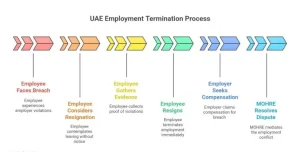The law and order situation in the UAE has always imposed justice. The job industry is equally protected, be it the employer or the employee. Article 121 of the UAE Federal Decree Law No.33 (2021) states that Labor relations and workers’ rights to end employment without notice under severe conditions or breaches from the employer.
This act intends to secure workers from bias and injustice in the workplace. This act aims to balance workers’ rights and ensure that the end of service without notice is legitimate for fair treatment.
Grounds for Early Termination by Employee
Article 121 permitted UAE workers to end their job contract immediately without any notice in case of employers violating labor laws and contractual obligations. For example, unpaid compensation, an insecure work environment, and physical harassment by the employer or representatives.
The workers need to provide sufficient proof of such violations and these strict regulations to prevent abuse of the right to resign instantly.
Employer Breach of Contract or Law
The employee may leave without cause at any time if the employer does not fulfill their responsibility as stated in the employment contract or under UAE labor law. This might involve unpaid wages, hazardous working conditions, or a work-hour violation.
Assault by Employer or Representative
Employees have the right to quit instantly and without giving notice if they are physically abused by their employer or a legal representative of the business (such as a manager).

Understanding the Implications
Workers need to understand the implications and carefully consider resigning without notice, as doing so without an acceptable reason could lead to legal sanctions or fines. Adequate evidence of employer violations and sufficient documents are required for justification. MOHRE handles all these disputes and conflicts and may arbitrate in these cases.
Notice Period vs. No Notice Resignation
Employers and employees are both protected under UAE labor law. Article 121 addresses in detail the circumstances in which an employee may leave without giving the required notice period of thirty days or longer as per the job contract.
Article 121 allows UAE workers to move immediately without notice in case of severe breaches or unfair treatment from the employer. If any worker resigns instantly due to personal reasons or dissatisfaction, the mandatory notice period is applicable. In case of non-compliance, the employee may face legal issues and fines.
With Notice Period:
Though it may be longer if specified in the contract, the majority of employment contracts in the UAE contain a minimum notice term of 30 days.
It is required of the employee to carry out their obligations throughout this notice period.
During this period, the company is required to pay the employee’s wage and benefits.
Without Notice period:
This will be practiced from now on by both employer and employees as per imposed by the labor law UAE. The law allows employees to leave the company if they face any of these opponents
Potential Compensation to Employer
The employer may claim compensation in case a worker resigns without serving the notice period and for unacceptable reasons. If the workers resign due to severe contract breaches or violations by the employer, they are not responsible for paying compensation to the employer. The proclaimed compensation is equal to the remaining job duration or the payment for the notice period.
Seeking Further Guidance
The employees can terminate their employment contract if they face any breaches. However, this might proceed with the legal complexities for end-of-service issues. In this case, they can file a complaint with MOHRE or may seek legal advisor services to go through the process.
MOHRE acts as the main point for conflict resolution, and intends to arbitrate for these types of legal issues before proceeding to the labor courts.
Consulting a Labor Lawyer in the UAE
The UAE Labor Law 121 grants employees the option to leave without giving notice in certain situations. But handling this kind of scenario may be tricky; thus, it can be quite helpful to get advice from a labor lawyer in the UAE.
The labor advocate assists workers in understanding their rights according to Article 121, collects proof, reduces risks, and negotiates settlements. Professional legal assistance helps workers to make wise decisions and also protects them against legal or financial consequences.
Confused about your rights under UAE Labour Law 121?
Acknowledging Your Rights and Duties:
A lawyer may make sure you understand your rights and duties, including the conditions that apply to a resignation without cause.
Collecting Proof and Creating a Strong Case:
A lawyer may offer guidance on the kinds of evidence that are required (papers, witness statements, medical records), as well as assist in obtaining it to support your case.
Negotiation Techniques and Dispute Resolution:
You may be able to work out a pay plan for the notice period with your employer, even if you have a good cause to quit. A lawyer can advise you on how to minimize your financial commitments via successful bargaining techniques.
Protecting Your Rights and Reducing Risks:
A lawyer may evaluate the viability of your notice-free resignation claim and provide you with information on any possible dangers. It can minimize any financial or legal ramifications and assist you in making well-informed decisions.
Peace of Mind and Well-Informed Decisions:
Handling disputes with employers may be taxing. By guaranteeing that you are aware of your alternatives and make the best decision possible for your circumstances, legal advice may ease your mind.
Seeking Guidance from MOHRE & Lawyers
Employees unsure about resignation under Article 121 should:
-
Contact MOHRE (80060) for official guidance.
-
Seek help from labour lawyers in UAE for case preparation and risk assessment.
Real-Life Examples
-
Case 1: An employee resigned under Article 121 due to unpaid salaries for 3 months. MOHRE ruled in favour of the worker and waived the notice period.
-
Case 2: A worker claimed unsafe conditions but lacked medical proof. MOHRE rejected the claim, and the employee had to compensate the employer.
Conclusion
Article 121 is applicable to the immediate resignation of the workers in case of severe conditions and violations by the employer. Keep in mind that quitting work without justified reasons and without serving the notice period can lead to penalties or compensation to the employer.
In certain situations, standard notice periods would still be in effect. Thus, even if Article 121 gives you authority, use caution. Workers need to provide reliable proof of employer violations. Consider legal advice before quitting work without notice to prevent legal consequences.
A proficient lawyer can guarantee a seamless settlement of your work-related issue. You may use Article 121 wisely and make wise judgments if you are aware of your rights and obligations.
FAQs
Q1: What does Article 121 of the labour law cover?
Article 121 gives workers the authority to resign without notice. The law covers violations by employers, such as:
- Unpaid wages
- Unsafe workplaces
- Physical harassment
Q2: Under what conditions can an employee resign without serving a notice period?
Workers can leave without notice if they face:
- Unpaid salaries
- Unsafe work conditions
- Contract violations
- Physical abuse
Q3: Are there legal safeguards for both parties under Article 121?
Companies are protected from baseless resignations. Workers are safeguarded against unfair treatment. The presence of MOHRE mediates disputes. It leads to fairness before cases escalate to labor courts.
Q4: How can employees safely invoke Article 121 when resigning?
Workers should collect strong evidence. They can file a complaint with MOHRE. It is recommended to seek legal advice so that their resignation is justified.
Q5: What documents are required for Article 121?
To prove employer violations, employees need reliable evidence such as:
- Salary slips
- Contracts
- Medical reports
- Witness statements



